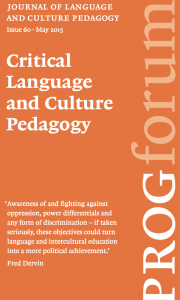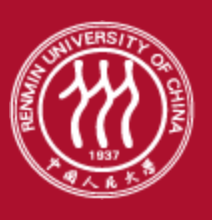Read about the training we organised, Haiqin Liu and myself, with the Confucius Institute at Helsinki U, HERE

(文德)
Read about the training we organised, Haiqin Liu and myself, with the Confucius Institute at Helsinki U, HERE
Bringing together ELF and intercultural communication research
18 March 2016
Earlier this month we published The Cultural and Intercultural Dimensions of English as a Lingua Franca edited by Prue Holmes and Fred Dervin. In this blog post, the editors explain how, until now, the fields of English as a Lingua Franca (ELF) and intercultural communication have remained quite separate but their book brings them together.
The Cultural and Intercultural Dimensions of English as a Lingua Franca
This book is the first of its kind. It brings together two very popular, yet separate, fields of research: ELF and intercultural communication. Although these two fields have been very productive and at the centre of scholarly and societal discussions in recent decades, their potential intersection has seldom been discussed in scholarly work. We started the project because we believed that ELF without interculturality—as much as interculturality without input from studies on lingua francas—is a little-investigated area and thus represents an opportunity to question orthodoxies and enrich research in both fields.
Our understanding of interculturality acknowledges the socially-constructed nature of intercultural communication, and the limitations of discourses of “cultural difference”, “respect for other cultures” and “tolerance” perpetuated by powerful institutions, the media, and even early scholarship in the field. Interculturalists are moving beyond these conceptualisations towards more politically-informed perspectives of intercultural encounters. What consequence does this move have for lingua franca research and pedagogy, and for ELF in particular?
In his foreword to the volume, Michael Byram notes that our book “may also turn out to be controversial … and all the better so.” Yet our main objective is not to create a polemic, or to nurture or perpetuate spurious disciplinary boundaries, but to open up fertile and interdisciplinary discussions of the cultural and intercultural in lingua franca communication. The introduction and nine chapters that compose the volume, as well as the stimulating commentary chapter by John O’Regan, all discuss how “culture” and “interculturality” can be understood, theorised, and operationalised in ELF, and the implications for pedagogy. The book will therefore appeal to researchers and teachers working in the fields of intercultural communication and language, in particular ELF, and on lingua francas other than English.
For more information about this book please see our website.

Co-organised with Helsinki CI:
Spring 2016 Chinese Language Teacher Training Workshop
201 6 年赫尔辛基大学孔子院芬兰境内汉语 教师 春季
赫尔辛基大学孔子学院与赫大教育学院将联合举办2016年芬兰境内汉语教师春季培训。此次培训特邀澳大利亚麦考瑞大学(Macquarie University)两位汉语教学专家与大家分享对外汉语教学中的创新教学方法,共同探讨汉语教师在芬兰汉语教学中遇到的挑战和机遇,真诚欢迎目前在芬兰境内大、中、小学或其他机构从事汉语教学的专职或兼职汉语教师参加。
主题: Opportunities and Challenges in Chinese Language Teaching in Finland 芬兰汉语教学中的机遇和挑战
时间: 2016年03月05日(周六) 10:00-16:00
地点: 赫尔辛基大学主楼Aud II (Unioninkatu 34)
培训内容:
上午:专家讲座:从学习者、教师、跨文化及科技四个方面探讨对外汉语教学中的创新方法,并对比澳大利亚与芬兰汉语教学的异同
下午:分组发言和讨论:教师在芬兰汉语教学中遇到的挑战和机遇,以及问题的解决办法
报名方式:请于2016年3月1日前发送邮件至 mariliina.rasanen@helsinki.fi 报名,邮件内容包括姓名、任教单位、联系电话。
注意事项:1) 报名后如因故不能参加,请提前三天告知孔子学院。
2) 孔子学院免费提供培训资料及当日午餐,并为首都地区(含Helsinki、Vantaa及Espoo)以外的每位参加培训者报销单程路费。
3)参会教师可提前准备5-8分钟的发言。请提前将发言题目和主要内容发至孔子学院中方院长 王红 hong.z.wang@helsinki.fi
想了解更多信息,请登陆赫大孔院网站http://www.helsinki.fi/confucius ; 如有其他问题,请咨询孔子学院中方院长王红
日程安排
Chinese language teachers´ training is meant for those who are currently working as full-time or part-time Chinese language teacher in Finland.

Current and Emerging Trends in Education Beyond Borders
本科生 硕士生 博士生
Undergraduate Master Doctoral students
Course in English by Prof. Fred Dervin (University of Helsinki, Finland)
Place: Renmin University, China, 5-28 July 2016
2 credits
This course introduces students to the many and varied ways education systems and educational institutions ‘do’ internationalization. The main current and emerging trends will be presented. The students will learn to discuss the pros and cons of internationalization and its challenges for all the actors involved. The students will also learn to analyse successful practice in relation to intercultural practices in the context of internationalization of education. Discussions of policies from around the world will strengthen the students’ analytical framework.
Most of the reading materials are research-based and/or theoretically driven articles and/or book chapters. Each class meeting includes required and optional reading assignments (the assignments listed under a particular class meeting must be read in advance of that class meeting). Both required and optional readings will be provided to students in the form of pdf files during the first class meeting.
More information here